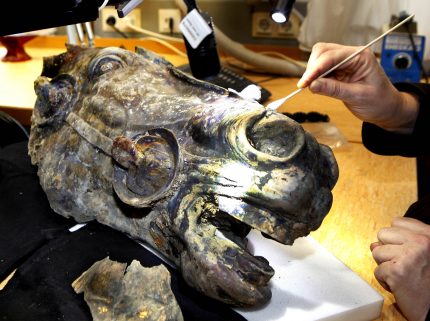
Way back in the short-n-sweet days of this here blog, almost a decade ago now, I reported on the discovery in Germany of an exceptionally well-preserved bronze horse head from a Roman-era equestrian statue. Archaeologists unearthed the life-sized equine head made of gilded bronze and a single human foot from the same statue near Waldgirmes in the central German state of Hesse on August 12th, 2009.
Waldgirmes is not mentioned in the historical record, but there was a Roman town there. The remains of a forum are the oldest known stone building foundation in Germany. Roman coins found at the site bear the profile of Publius Quinctilius Varus, the first governor appointed of the newly-official Roman province of Germania in 7 A.D. and notorious loser of the Battle of the Teutoburg Forest two years later.
The style and quality of the horse head date to the earliest period in the area’s Roman history. The horse’s bridle is decorated with reliefs of Mars, god of war, and Victoria, personification of Victory. It was likely part of an equestrian statue of the Emperor Augustus which stood in the settlement since its foundation in around 4 or 5 A.D. and was destroyed by the victorious Germanic tribes after the Battle of Teutoburg Forest. They dismembered the symbol of imperial domination and tossed the head and foot into a well. Very much contrary to their intent, the waterlogged environment preserved the broken pieces in exceptional condition.
At the time of the discovery, the state of Hesse paid the landowner of the find site 48,000 euros in recompense for the head and foot in accordance with the regional cultural patrimony laws, but the farmer was not satisfied that the accounting was accurate. Comments like this one from Eva Kuehne-Hoermann, Hesse’s state minister for science, at the Frankfurt unveiling of the gilded horse head: “This bronze sculpture counts among the best pieces to have ever been found from the area of the former Roman empire. Nowhere else is there a finding of this form or quality.” might have tipped him off.
A new ruling from a regional court backs the farmer’s position.
The Limburg regional court said Friday that, according to state law at the time, the farmer was eligible to half the value of the head, which an expert estimated at around 1.6 million euros. He would also be entitled to interest.
That makes for a grand total of 773,000 euros (nearly $904,000) owed to the landowner by the state government, plus any interest that has accrued in the nine years since the discovery. The ruling can be appealed so it’s not necessarily the final determination.
It’s been ten years and it still looks like that?
What still looks like what? :confused:
According to Paterculus: “it was at this time that I became a soldier in the camp of Tiberius Caesar, after having previously filled the duties of the tribunate. For, immediately after the adoption of Tiberius, I was sent with him to Germany as prefect of the cavalry. […] The Canninefates, the Attuarii,a and Bructeri were subdued, the Cherusci (Arminius, a member of this race, was soon to become famous for the disaster inflicted upon us) were again subjugated, the Weser crossed, and the regions beyond it penetrated.”
In 10 BC, the Chatti joined with the Sicambri and attacked Drusus’ camp, but they were driven back. Drusus pursued them, proceeding from the sites of present-day Mainz and Rödgen, where he set up a base of supply, to Hedemünden ( 9° 46′ 06,1″E, 51° 23′ 23,9″N), where a strong new camp was established. However, the Ubii had seemingly already been successfully “resettled” to the Rhine for safety reasons by Agrippa.
There is the Dünsberg hillfort at 8° 34′ 50,5″E, 50° 39′ 00,1″N, where at gate “4”, tellingly pointing to Waldgirmes –at 8° 32′ 28,7″E, 50° 35′ 19,3″N, in a distance of roughly 10km, Roman artillery lead and weapons have been found. Also, there is a local coin type from Dünsberg, Waldgirmes and Limburg.
According to Cassius Dio (Book LVI): “…not entire regions, but merely such districts as happened to have been subdued, so that no record has been made of the fact — and soldiers of theirs were wintering there and cities were being founded. The barbarians were adapting themselves to Roman ways, were becoming accustomed to hold markets, and were meeting in peaceful assemblages. They had not, however, forgotten their ancestral habits, their native manners, their old life of independence, or the power derived from arms.”